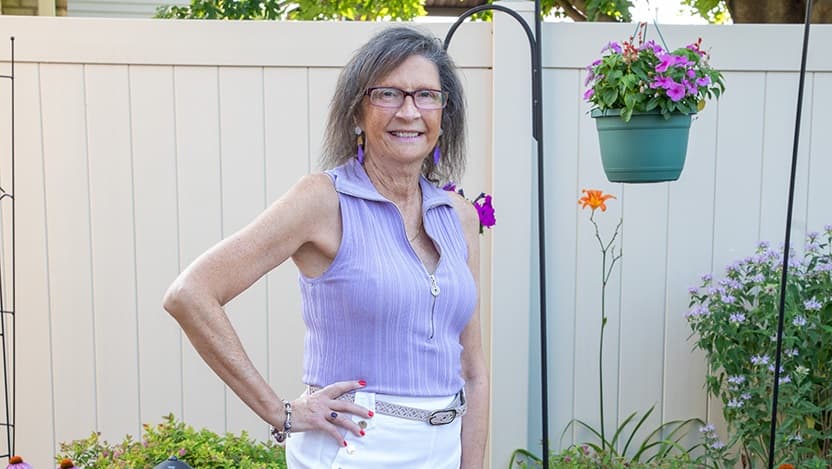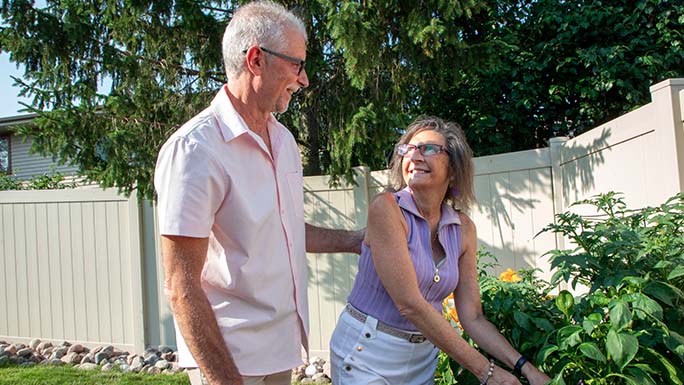Inspired by a famous chef's treatment journey, woman seeks care for advanced tongue cancer at UChicago Medicine

Pat Sirvinskas has always enjoyed her morning coffee. But three years ago, she noticed a strange phenomenon every time she took a sip.
"I would drink coffee and get a burning sensation in my neck," recalled Sirvinskas, now 61, who runs a specialty window and door company in Oak Lawn, Illinois, with her husband, Mark. "I thought, ‘This is weird.’"
A biopsy and PET scan revealed she had stage 4 tongue cancer that had spread to multiple lymph nodes in her neck.
Sirvinskas was devastated. And it wasn't her first experience with cancer: She had already been treated for non-Hodgkin lymphoma, skin cancer and breast cancer.
Because of the size and location of the tumor, a doctor at a Chicago hospital suggested cutting out more than half of her tongue. But Sirvinskas didn't want her ability to speak and swallow to be affected by surgery.
That's when Mark recalled a 2016 episode of "Chef's Table," a Netflix documentary series, focused on chef Grant Achatz, owner of the Michelin-starred Chicago restaurant, Alinea.
Second opinion for tongue cancer
Achatz was also diagnosed with stage 4 tongue cancer, and he was told in 2007 that he would need surgical removal and reconstruction of more than half of his tongue. He sought another opinion at UChicago Medicine, where doctors saved his tongue with chemotherapy and radiation.
"When I heard Achatz was 19 years cancer-free and still had his tongue, that was just amazing," Mark said.
On their first visit to UChicago Medicine, the Sirvinskases met with a team of specialists: head and neck surgical oncologist Nishant Agrawal, MD, medical oncologist Ari Rosenberg, MD, and radiation oncologist Aditya Juloori, MD.
"Our multidisciplinary approach is very important not only for optimizing a patient's chance at being cured, but also in optimizing long-term function," Rosenberg said.
In March 2021, Sirvinskas started eight weeks of chemotherapy to shrink the tumor, followed by a course of radiation with chemotherapy over the subsequent weeks.
She says the hardest part was missing her family — her husband and three sons couldn't be with her at the hospital due to COVID-19 visitor restrictions. The patient relied on her Catholic faith and the kindness of her nursing team to fill the void.
"You're in your own little cubbyhole for 12 hours and it was just very isolating," said Sirvinskas, who celebrated her 58th birthday in the hospital with nurses who decorated her room and even bought her a cake.

Tongue preservation, rehab offer strong outcomes
The radiation was daunting: Sirvinskas lay on an imaging table with a breathable, molded mask bolted over her head. This ensured her head would not move and that radiation precisely targeted her tongue without hitting nearby healthy tissue.
"There's no question this treatment requires a lot of aggressive support," Rosenberg said. "When we're able to preserve the tongue, patients value having a functional tongue and being able to speak and eat, and our data suggests our outcomes are comparable, if not better, to those of patients treated with upfront surgery."
During this time, Sirvinskas needed a feeding tube and relied on a small blackboard to communicate with her husband and three sons. Her neck was red and painful from the radiation, and she continues to experience a burning sensation in her mouth from her many cancer treatments. With intense rehabilitation, Sirvinskas is now able to eat, drink and speak again.
She says she unequivocally made the right treatment decision.
"That would not be living for me if I was not able to eat or speak to what I am used to," Sirvinskas said.
Genetic testing for cancer finds rare condition
Due to her history of multiple cancers, Sirvinskas was referred by her treatment team for cancer genetic testing, and it led to an important discovery.
Tests revealed that Sirvinskas has a rare condition, Bloom syndrome, which increases her chance of getting cancer. She has recurring checkups to ensure she continues to be cancer-free.
"It's important that patients with Bloom syndrome have regular screenings for things they're more at risk for," said Feighanne Hathaway, a genetic counselor at UChicago Medicine. "Unfortunately, there's no correcting gene errors that have occurred, but we can add additional surveillance to catch any cancers early."
It's been a long journey, but Sirvinskas is hopeful her good health continues. After all, exciting developments await — including the arrival of her fifth grandchild in August.
"Oprah says the 60s are good," Sirvinskas said. "I have a good sense of humor and a heart full of gratitude, so what more could you ask?"
